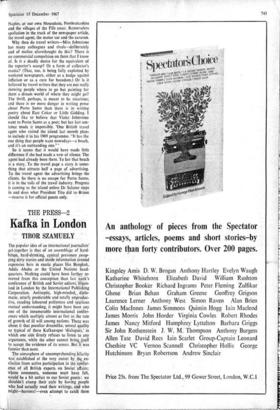Kafka in London
THE PRESS-2
TIBOR SZAMUELY
The popular idea of an international journalists' get-together is that of an assemblage of hard- bitten, hard-drinking, cynical pressmen swop- ping dirty stories and inside information around expensive bars in exotic places like Bangkok, Addis Ababa or the United Nations head- quarters. Nothing could have been flirt* re- moved from this conception than last week's conference of British and Soviet editors, -organ- ised in London by the International Publishing Corporation. Antiseptic, high-minded,, diplo- matic, utterly predictable and totally unproduc- tive, exuding laboured politeness and spurious mutual understanding, it might have been any one of the innumerable international confer- ences which multiply almost as fast as the rate of growth of ill will among nations. There was about it that peculiar dreamlike, unreal quality so typical of these Kafkaesque 'dialogues,' in which one side firmly refuses to listen to any arguments, while the other cannot bringeitself to accept the evidence of its senses. But it was funnier than most.
The atmosphere of uncomprehending hilarity was established at the very outset by thc ex- clusion from active participation in the confer- ence of all British experts on Soviet affairs; whose comments, someone must have felt, would be a bit unfair to our Soviet guests: we shouldn't cramp their style by having people who had actually read their writings, and who might—horrors!—even attempt to catch them out in some undoubtedly well-meant lie. (Ilie Russians, needless to say, had no such inhibi- tions, and included all their London correspon- dents in their delegation.) Thus it came about that some British participants expressed them- selves to be 'perplexed' about Soviet attitudes in the Middle East, 'puzzled' about the Sinyav- sky trial, and deeply depressed by the fact that all members of the Soviet delegation spoke with monolithic unanimity, while they them- selves reflected a wide variety of views. What on earth did. they expect: that the Russians would suddenly open up their souls and pour out their innermost thoughts and heartfelt feel- ings? The Russians, of course, did nothing of the kind; their views, they explained, were iden- tical because they spoke for their people (some, indeed, even managed to imply that they were speaking for the British people as well).
The conference covered almost every subject under the sun, from Anglo-Soviet technological cooperation to the war in Vietnam. But it was over the Middle East that it really touched the sublime heights of farcicality. At this point the Russians' unvarying tone of upright morality was transformed into virtuous indignation. The pursuit of national interests, they cried, was immoral—foreign policies should be guided (as their own government's was) by transcendent considerations. What is the world coming to, demanded one after another, when a country permits itself to 'conquer and occupy territory of other countries? The idea! This was 'jungle law,' which the Soviet Union, true to its Leninist principles, could never accept. If Israel had felt aggrieved, why did she not apply to the Security Council, which would have found a speedy solution?
The British journalists, though somewhat taken aback by this incomparable effrontery, continued doggedly to .recite the facts of the case—a supererogatory exercise, since these were as well known to the Russians as to them- selves. But facts, as the Soviet journalists pity- ingly pointed out, were neither here nor there: what was required of the press was not 'facts' but 'objectivity'—meaning 'service to the cause
of peace' and 'strengthening relations between states,' meaning, in turn, the suppression of stories unfavourable to the Arabs or anybody else who was on the side of 'progress.' Quite simple, really, as even a cursory reading of Pravda would show.
The. untrained British contingent mustered only one all-out attack : over the rigid prohibi- tion on the entry of foreign publications into Russia. And quite properly so : given the extra- ordinary notion of an international journalists' conference, this was the sole legitimate item on its agenda. It was the only debate that really mattered—and the Agitprop boys lost very heavily indeed. They found it impossible to deny, in London, 'that Russian papers were freely sold here, and they could hardly admit that the mighty Soviet state was afraid to let its citizens—`the freest in the world'—catch a glimpse of the foreign press. Yet their audience was obviously too sophisticated (they really did us proud there) to be treated to the customary crudities about the Soviet people refusing to be degraded by reading our filth. So we were treated to a wide variety of arguments: the jocular (`our British colleagues seem anxious to solve their circulation problems at our ex- pense, ho-ho-ho!'); the baffled (`what is all the fuss about?'); the utilitarian ('would this be of any practical use to our people?'); the obfusca- tory ('we publish a special weekly, Za Rubez- horn, which reprints every important article from the world press'); the negotiatory ('first you should dissolve NATO and recognise the Goa); and the plain moronic (`since there are many more Russians who know English than there are Englishmen who know Russian, you would always have a built-in advantage over us —but we can only trade under conditions of complete parity').
Essentially, however, their case rested on the simple proposition that the Soviet press already provided their readers with a fuller, fairer and better balanced picture of world affairs than anything we bourgeois hacks could ever dream of approaching. One delegate solemnly swore (such was the pathos and piety of his declara- tion that I half-expected him to cross himself) that' in no Soviet publication could one find even the remotest hint of bias against the West, and that all went out of their way to describe every positiveaspect of western life. It was a moving moment. The only thing that stopped me from bursting into tears was the recollec- tion of a letter printed in The Times a few days before : a British doctor, recently returned from Russia, described his (generally favour- able) ithpressions, yet expressedgreat surprise that none of his medical audience at a lecture in Kiev had ever heard of the existence in Biitainof a free National Health Service. Would he'llless surprised, I wonder, were he to learn that -this basic aspect of British life has never, in all-the twenty years of its existence, been men- tioned in the Russian press?
Suinming up the conference, a British parti- cipant declared that it had helped us to under-
stand each other's thinking. I hope he was right —even though the actual proceedings provide little proof of this. But then, that was hardly its Object. Come to think of it, what was its object?



































 Previous page
Previous page